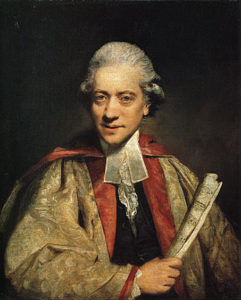
We mark the death on April 12, 1814 – 207 years ago today – of the English music historian and composer Charles Burney, in London.
One rarely achieves much fame or fortune as a music historian; you can trust me on this; it’s something I know about firsthand. Nevertheless, Dr. Burney (he was awarded an honorary Doctor of music degree from Oxford) achieved a bit of both fame and fortune in his lifetime and immortality since. That’s because he didn’t just write blogs or record podcasts about music history; it’s because he lived it. Lots more on this once we (quickly) get through his biographical preliminaries.

He was born on April 7, 1726 in the market town of Shrewsbury, some 150 miles northwest of London. (For our information, Shrewsbury was, as well, the hometown of Charles Darwin.) The artistic gene was in the family: Burney’s father James was a musician, dancer, and portrait painter. Young Charles was trained on the organ, harpsichord, violin and in composition. For three years he was apprenticed in London with Thomas Arne (1710-1778), the most important English-born composer of theater music in the eighteenth century. (Many of us might not have heard of Arne, but we’ve all heard his music, which famously includes Rule Britannia, Britannia Rules the Waves and A-Hunting We Will Go.)
For all the drudge work involved in his apprenticeship (Arne worked Burney like a galley slave), Burney learned not just music but he met, impressed, and befriended many of the movers and shakers on the London musical and theatrical scene.
Thanks to his apprenticeship with Arne, doors opened for the young Charles Burney.
In 1745, while still working with Arne in London, the 19-year-old Burney was introduced to George Frederick Handel, who hired him to play in the orchestra for two of his brand-new oratorios, Hercules and Belshazzar.
Thanks to Handel, more doors opened, and Burney was hired into the orchestras of the Drury Lane Theater and Vauxhall Gardens.
His apprenticeship over, the twenty-something Charles Burney was a highly intelligent, well-spoken, affable and attractive young man. He was also ambitious and upwardly mobile, and he cultivated people of wealth, power, and intellect. By 1750, the 24-year-old Burney had established himself as an organist, harpsichordist, and composer there in London. He put it this way:
“I began to be in fashion in the City, as a Master [that is, as a teacher], and had my hands full of professional business of all kinds at both ends of the town, Composition, & public playing.”
…Continue Reading, only on Patreon!
Become a Patron!Listen on the Music History Monday Podcast
Podcast: Play in new window
Subscribe: Apple Podcasts | Spotify | Pandora | iHeartRadio | RSS | More
